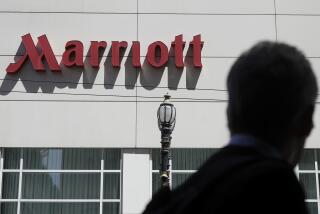Wal-Mart pledges to hire any returning veteran who wants a job
NEW YORK — Retail giant Wal-Mart Stores Inc. pledged to employ any returning veteran who wants a job in a hiring push that will kick off Memorial Day.
The initiative could mean as many as 100,000 hires over the next five years, according to the company. It also comes as the White House has been encouraging businesses to hire veterans who return from deployment amid a tough U.S. job market.
In a speech to the National Retail Federation on Tuesday, Wal-Mart Chief Executive Bill Simon pledged to hire “any honorably discharged veteran in his or her first 12 months off active duty.” His speech also briefly touched on Wal-Mart’s plans to buy more products from the U.S. and help more employees become full time.
It was the 2012 election and the gridlock in Congress that motivated Simon to introduce these initiatives, he said.
“The election clarified for me that it’s time for those of us outside politics to get to work,” he said. “I find it fascinating that during the campaign we all waited with bated breath each month for the government to tell us how many private-sector jobs were created. After all, it’s the private sector that creates jobs.”
Veterans will be placed in jobs in stores, clubs, distribution centers and in the corporate office, he said.
Some retail workers questioned whether veterans would want to work for Wal-Mart. They include Edgar Lucas, 38, a U.S. Army veteran who has worked for Wal-Mart and other retailers in New York.
“If you are looking out for the veterans, they need something that’s guaranteed 40 hours a week,” he said. “Everybody knows that Wal-Mart, they’ll work you 28 hours, make sure that you don’t get 40.”
Lucas, who lives in the Bronx, said most retail jobs are the same. He’s been stringing together various such jobs, trying to get enough hours, knowing that he won’t get benefits unless he gets to full time.
During Simon’s speech, a group of protesters in the hall unveiled a banner that read, “NRF: Stop Clocking Out Workers, It’s Time for Good Jobs and Just Hours.” They chanted in the hall until they were escorted out. About 100 workers from various New York groups also protested outside.
“Workers are going to make sure that the kind of jobs that they’ve announced for veterans are the kind of jobs that workers need,” said Yana Walton, a spokeswoman for Retail Action Project. “That means enough hours and living wages and jobs with benefits.”
Simon defended Wal-Mart jobs during his speech.
“We’re all tired of retail jobs being put down, as if retail workers can’t judge for themselves what a good job is,” he said. “Some people say we don’t offer good jobs. I say this industry is the greatest engine of opportunity in the United States of America.”
Simon pledged to bring more transparency to Wal-Mart’s scheduling system to allow part-time workers to choose their own hours, and said the company would make internal changes to help part-timers become full time. He didn’t provide details about how the company would do that. He did say, however, that 75% of Wal-Mart’s store management started as hourly associates.
He concluded his speech by announcing that Wal-Mart and Sam’s Clubs will also increase what they buy in the United States, including sporting goods, games and paper products. The company plans to buy an additional $50 billion in U.S. products over the next 10 years, he said.
Not surprisingly, Wal-Mart’s detractors were unimpressed. They pointed reporters to a City University of New York study that showed almost 60% of the retail workforce consists of people hired as part time or temporary and that only 17% of workers have a set schedule.
Walton, the Retail Action Project spokeswoman, said workers would make sure that Wal-Mart followed up on its commitments to make scheduling more transparent.
“If these promises aren’t kept, workers will keep fighting the way we’ve been fighting,” she said.
More to Read
Inside the business of entertainment
The Wide Shot brings you news, analysis and insights on everything from streaming wars to production — and what it all means for the future.
You may occasionally receive promotional content from the Los Angeles Times.











